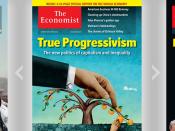Global economy is defined as the interconnection of the economies of politically independent countries in trade, transfers of capitol, labor, production, and distribution. The global economy has emerged, for the most part, in the last fifty years since World War II. Undoubtedly, the global economy is here to stay; several factors have contributed to this. Less than fifteen years ago, no one had heard of www.whatever.net. Most people now know that "www" stands for World Wide Web. This descriptive term itself indicates how globalization has affected all aspects of our economy. All continents can now be interconnected by a "web" that weaves throughout the whole wide world. Information can be transferred instantaneously. Transportation is easier, thus allowing barriers to be broken down, and means of production and management have also improved.
Poor communication can be one of the greatest barriers to having a good relationship. Live video communication, e-mail, fax machines and other electronic devices have helped to eliminate slow or mis - communication between businesses on opposite end of the world.
Consequently, business relationships have emerged that would have been difficult, if not impossible, to have had just a few decades ago. Physical distance has also become almost a non-issue. Planes fly from continent to continent, allowing one to be nearly anywhere in less than a day. Products and goods are easier than ever to deliver. Trade has become internationalized, and a customer in China should have no problem purchasing an item made in the U.S.A.
Not only can goods be purchased from every corner of the world, goods can be produced nearly anywhere. Factories can be set up in parts of the world where labor costs are low, thus cutting the cost of the good to the consumer. Although most consumers would prefer to pay a cheaper price...


